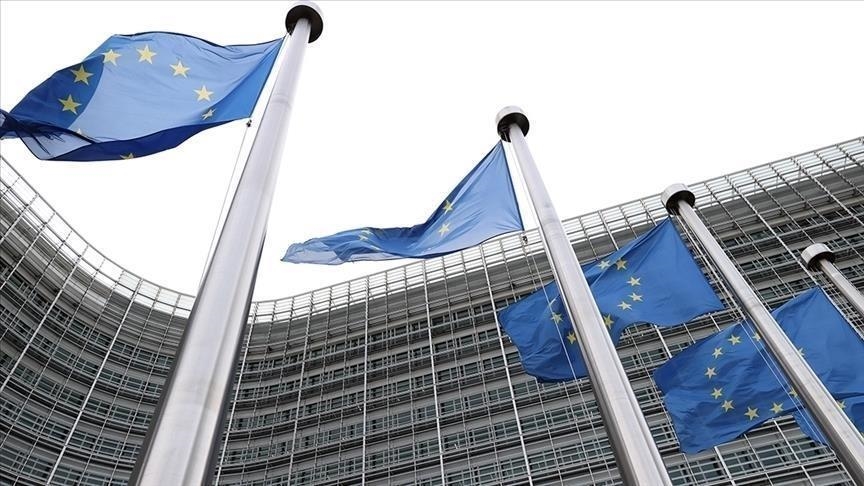Could EU use visa-free travel change to pressure Israel?
The EU is moving to overhaul how it revokes visa-free access for human rights violators, while also reviewing trade deal with Israel

- European Parliament lawmaker Matjaz Nemec says Israel meets the criteria, but doubts ‘the current right-wing-dominated European Parliament could actually pass such a resolution’
BRUSSELS
The EU is advancing plans to make it easier to suspend visa-free travel for countries accused of serious human rights abuses – a shift that observers say could give Brussels new leverage to pressure Israel over its actions in Gaza and the occupied West Bank.
On Tuesday, the European Parliament and European Council reached a political agreement to overhaul how the bloc revokes visa-free access, granting the EU sharper tools to act when third countries violate international law.
Janne Ojamo, the European Parliament’s press officer, confirmed to Anadolu that the proposed rules would apply to all 61 countries currently enjoying visa-free Schengen access, including Israel.
The changes allow for suspensions if a country breaches the UN Charter, flouts international human rights or humanitarian law, or disregards international court rulings.
Israel currently faces genocide allegations at the International Court of Justice, and Prime Minister Benjamin Netanyahu is subject to an International Criminal Court arrest warrant for alleged war crimes.
Under the revised EU visa rules, such developments could justify requiring Israeli travelers to apply for visas.
While the deal still needs to be formally adopted by both the European Parliament and the European Council, it marks a significant shift in the EU’s willingness to leverage visa access as a diplomatic tool.
“That process will take some time. So, while this development is politically significant, translating that into legal significance still lies in the future,” Gavin Barrett, professor of EU constitutional and economic law at University College Dublin, told Anadolu.
“The main purpose of this amendment is to give the EU more flexibility to temporarily suspend its visa-free travel schemes where it feels that these are being misused. It is true, however, that it can also be deployed for severe breaches of international human rights or humanitarian law,” he explained.
The EU has also recently said it plans to review its trade and cooperation agreement with Israel – a deal that gave Tel Aviv significant trade and economic privileges, among other things, and was dependent on respecting human rights and international law.
Barrett said the ability to revoke visa-free travel could be even more effective than suspending the trade agreement, as it would allow the EU to target specific government officials.
‘Conditions would be met for Israel’
Matjaz Nemec, the European Parliament’s lead negotiator on visa policy, said the suspension process could be triggered by any EU member state or the parliament itself.
Once triggered, the commission would be required to assess the situation and could propose suspending visa-free travel for an initial period of 12 months if the criteria are met.
“The suspension can be partial, for example, limited to diplomatic or service passports,” Nemec explained.
Still, he said, the ultimate decision lies with the European Commission, which could block certain applications.
“While I personally do believe the conditions under the regulation would be met for Israel, I doubt that the current right-wing-dominated European Parliament could actually pass such a resolution,” he told Anadolu.
Reviewing ties with Israel
In parallel, the EU is preparing to decide whether to impose trade sanctions on Israel under the EU-Israel Association Agreement, which links trade benefits to respect for human rights.
After months of inaction, European capitals have grown more critical of Israel’s genocidal war on Gaza, and 17 of the EU’s 27 member states backed a Dutch-led initiative to review Israel’s compliance with the agreement in May.
The review, originally proposed by Spain and Ireland in February 2024, is expected to conclude by the EU foreign ministers’ meeting on June 23.
If Israel is found in breach, the EU could vote by qualified majority to suspend preferential trade terms. The consequences could be significant, given that the EU is Israel’s largest trading partner.
Although a complete suspension is considered unlikely due to resistance from countries like Hungary, more targeted actions remain possible, including limiting Israeli participation in EU-funded initiatives like the Horizon Europe research program or curbing specific trade privileges.
Anadolu Agency website contains only a portion of the news stories offered to subscribers in the AA News Broadcasting System (HAS), and in summarized form. Please contact us for subscription options.







